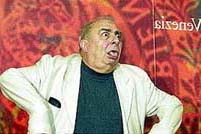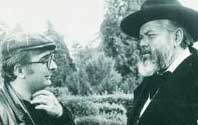 Along
with Jean-Luc Godard and François Truffaut, Claude
Chabrol was part of that astonishing trinity of critics-turned-filmmakers
responsible for the birth of the New Wave of French
Cinema at the beginning of the 60s. At the start, though
LES COUSINS and LE BEAU SERGE were hailed as New Wave
hits, he seemed the lesser artist of the three, but
time has altered that initial ranking: Chabrol now stands
as one of the world's last classicist directors. The
turning tide was marked by LES BICHES (1968), his exquisitely
composed Hitchcockian exercise in sexual transference
and betrayal and the terrible fluidity of identity.
The film featured Nice in winter and the glorious Stéphane
Audran, Chabrol's then-wife and star for the next quarter-century
or so. With a coolly observant eye, he would continue
to voluptuate in the specifics of places and seasons
(and cuisine), and to explore the ambiguities of sin,
guilt and penance. (Chabrol had co-authored a book-length
study of Hitchcock with Eric Rohmer; no wonder he demonstrated
a sometimes stone-cold comprehension of the kinds of
sad, murderous beasts that lie in the darkness behind
the human brain.)
Along
with Jean-Luc Godard and François Truffaut, Claude
Chabrol was part of that astonishing trinity of critics-turned-filmmakers
responsible for the birth of the New Wave of French
Cinema at the beginning of the 60s. At the start, though
LES COUSINS and LE BEAU SERGE were hailed as New Wave
hits, he seemed the lesser artist of the three, but
time has altered that initial ranking: Chabrol now stands
as one of the world's last classicist directors. The
turning tide was marked by LES BICHES (1968), his exquisitely
composed Hitchcockian exercise in sexual transference
and betrayal and the terrible fluidity of identity.
The film featured Nice in winter and the glorious Stéphane
Audran, Chabrol's then-wife and star for the next quarter-century
or so. With a coolly observant eye, he would continue
to voluptuate in the specifics of places and seasons
(and cuisine), and to explore the ambiguities of sin,
guilt and penance. (Chabrol had co-authored a book-length
study of Hitchcock with Eric Rohmer; no wonder he demonstrated
a sometimes stone-cold comprehension of the kinds of
sad, murderous beasts that lie in the darkness behind
the human brain.)
 During
the 70s, Chabrol's "genteel-bourgeois-murder cycle"-
LA FEMME INFIDELE, LE BOUCHER, LA RUPTURE, QUE LA BÊTE
MEURE , JUSTE AVANT LA NUIT AND LES NOCES ROUGES - almost
all starred Audran, with actors Michel Bouquet (to whom
LES BICHES had been dedicated) and Jean Yanne coming
to assume symbolic roles in the very fallen worlds dreamed
by the director. Beginning in 1978, with Violette Nozière,
Chabrol began to investigate the often-masklike visage
of actress Isabelle Huppert, trying to plumb the buried
truths of seemingly sociopathic characters who matter-of-factly-amorally?-murder,
follow the lure of money, hate the bourgeois to death.
During
the 70s, Chabrol's "genteel-bourgeois-murder cycle"-
LA FEMME INFIDELE, LE BOUCHER, LA RUPTURE, QUE LA BÊTE
MEURE , JUSTE AVANT LA NUIT AND LES NOCES ROUGES - almost
all starred Audran, with actors Michel Bouquet (to whom
LES BICHES had been dedicated) and Jean Yanne coming
to assume symbolic roles in the very fallen worlds dreamed
by the director. Beginning in 1978, with Violette Nozière,
Chabrol began to investigate the often-masklike visage
of actress Isabelle Huppert, trying to plumb the buried
truths of seemingly sociopathic characters who matter-of-factly-amorally?-murder,
follow the lure of money, hate the bourgeois to death.
You might say that Chabrol's films
bloom during those fraught hours just before night falls
on his flawed, all-too-human protagonists-often the
encroaching darkness of death heralds epiphany and /or
a species of ecstasy. And in stark contrast with much
of contemporary filmmaking, Claude Chabrol's classical
cinema marries form and content in a seamless, deeply
satisfying union. Alfred Hitchcock would be proud of
his spiritual son.